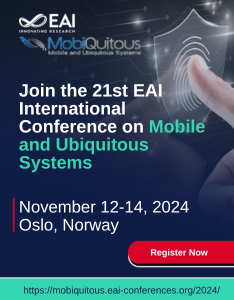
Research Article
Persuasive Technology for Human Development: Review and Case Study
@ARTICLE{10.4108/eai.8-12-2017.153401, author={Ali Harris and Saif ul Islam and Junaid Qadir and Ussama Ahmad Khan}, title={Persuasive Technology for Human Development: Review and Case Study}, journal={EAI Endorsed Transactions on Serious Games}, volume={4}, number={12}, publisher={EAI}, journal_a={SG}, year={2017}, month={12}, keywords={Persuasive Technology, Human Behaviour, Behavioural Economics, Nudge}, doi={10.4108/eai.8-12-2017.153401} }- Ali Harris
Saif ul Islam
Junaid Qadir
Ussama Ahmad Khan
Year: 2017
Persuasive Technology for Human Development: Review and Case Study
SG
EAI
DOI: 10.4108/eai.8-12-2017.153401
Abstract
Technology is an extremely potent tool that can be leveraged for human development and social good. Owing to the great importance of environment and human psychology in driving human behaviour, and the ubiquity of technology in modern life, there is a need to leverage the insights and capabilities of both fields together for nudging people towards a behaviour that is optimal in some sense (personal or social). In this regard, the field of persuasive technology, which proposes to infuse technology with appropriate design and incentives using insights from psychology, behavioural economics, and human-computer interaction holds a lot of promise. Whilst persuasive technology is already being developed and is at play in many commercial applications, it can have the great social impact in the field of Information and Communication Technology for Development (ICTD) which uses Information and Communication Technology (ICT) for human developmental ends such as education and health. In this paper we will explore what persuasive technology is and how it can be used for the ends of human development. To develop the ideas in a concrete setting, we present a case study outlining how persuasive technology can be used for human development in Pakistan, a developing South Asian country, that suffers from many of the problems that plague typical developing country.
Copyright © 2017 Ali Harris et al., licensed to EAI. This is an open access article distributed under the terms of the Creative Commons Attribution licence (http://creativecommons.org/licenses/by/3.0/), which permits unlimited use, distribution and reproduction in any medium so long as the original work is properly cited.


